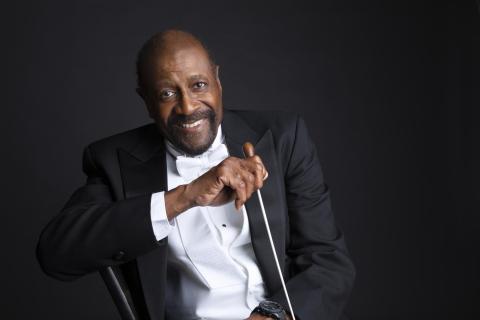Julius P. Williams on Composing for the Rededication of Boston's Shaw Memorial

Julius P. Williams
Image courtesy of Robert Toress
Berklee Now's Keyed In series features Berklee artists and experts making news and sounding off on the latest news and trends from the music world and beyond.
Julius P. Williams has had a storied career that just seems to keep getting better. The Berklee professor, who teaches in the Composition Department, has just made a significant addition to his body of work as a composer. On June 1, “Heroes,” a song he was commissioned to write for the national rededication of the Colonel Robert Gould Shaw and 54th Massachusetts Regiment Memorial, was performed by the Boston’s Children’s Chorus at the ceremony in front of the monument on Boston Common.
The composer and conductor has written operas, symphonies, and chorus works for stage, concert hall, film, and television. In addition to his 26-year teaching career at Berklee, Williams is the artistic director and conductor of the Berklee Contemporary Symphony Orchestra, a composer in residence with the Boston Symphony Orchestra, and cover to maestro Keith Lockhart and the Boston Pops Orchestra. In 2019, the award-winning conductor was named the first African American president of the Conductors Guild.
We caught up with Williams to talk about his latest project and illustrious career.
The Shaw 54th memorial is called “one of the 10 monuments that changed America.” Your original composition “Heroes” will be forever linked to this monument. Where does this rank on your wall of achievements, and how is it different from other pieces you’ve composed?
I’m honored and humbled to be a part of such an important part of American history. Initially, I didn’t realize how the music was going to be used, and I didn’t realize it was going to be such a huge event. These soldiers were fighting for their freedom to show they were equal to everyone else. Hopefully, this song captures their fight and spirit.
Because of the historic significance, did you change or alter how you approached composing this piece?
I composed the piece like I would compose any other piece. My approach stayed the same but what made it hard is that it was made for a children’s choir, and children didn’t need to hear some of the graphic events that took place, so I had to make it uplifting and still tell the story without all the violence that was involved. I also read several books and writings, including one by Frederick Douglass, to help inspire me.
You have already made history after being elected the first African American president of the Conductors Guild. As we know, representation matters. Who inspired you in the early stages of your journey, and what do you hope aspiring young artists might feel when they see the success you’ve had?
I wouldn’t be here today if I didn’t have three people in my life. I grew up in New York City, and I was part of a group.... We were part of a high school choir, and we performed for all the dignitaries who came to New York. In that period I met a composer named Coleridge-Taylor Perkinson, an African American composer/conductor, and I saw him on the stage of the Lincoln Center and said, "I want to be like this guy." I met him and he thought I was talented and started to give me jobs, so at 17 years old I was playing off-Broadway. John Motley, a teacher of mine, introduced me to a lot of people. And finally, a great composer, Ulysses Kay, sort of the “dean of Black composers,” he also helped me meet a lot of people. By the time I was 18 years old, I was working with Alvin Ailey, Leonard Bernstein, and others.
I try to tell my students that you don’t think of success as being famous; you think of success as trying to do the work that you need to do. Sometimes they see the financial thing, but success is within you.
Which do you prefer, conducting or composing?
People mistake and think if you are a conductor you’re automatically a composer, and if you are a composer you’re automatically a conductor, which is not true. Some conductors are the worst composers and vice versa. They may compliment each other, but they are different and I happen to be a conductor who is also a composer. However, many great composers couldn’t conduct themselves out of a paper bag. One is a performance art and one is kind of a creative art. As a composer, I look for how to make that piece come together, understanding the color and the harmonic structure, but if I’m a conductor I have to figure out how to make that piece work in this environment, and every environment is different.
What key teachings do you try to impart on your students to set them up for success in this field?
Some of the key teachings are to study hard and to listen to other people, have an open mind to listen and learn, and how to listen to other people. Ultimately, you need to have a vision of where you want to go and what you want to see. And finally, don’t be arrogant!
